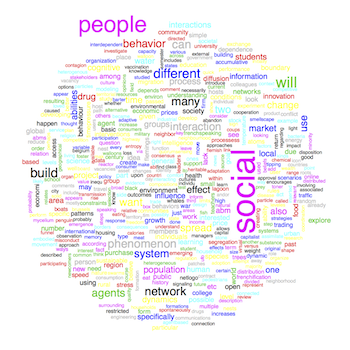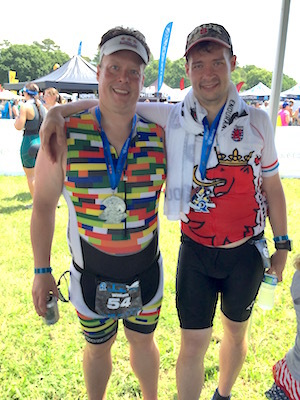
- 08 May 2017
The Introduction to Agent-based Modeling online course is opening for its second session on June 5th, 2017, and the course instructor, Bill Rand, is updating a large section of the course. He talked to us about the lessons he learned from the 2016 course, what's new for 2017, and why he competes in Ironman competitions.
Your MOOC was very popular, despite being the first time you ever created and ran a MOOC, and despite the fact that Complexity Explorer launched its peer review system in the middle of the course - with many associated bugs. What did you learn from the first session about how to create and run a MOOC? Where do you think you could improve? What were you proud of?
One thing that I learned was that the forums are a strong key to the success of the MOOC. Because of the nature of MOOCs, Anamaria and I can't respond to every single question that every single person has instantaneously (though we do our best!). The forums provided a rich source of questions and answers about the course. Anamaria and I prioritized checking in on the forums every day, but more often than not another student had already answered the questions that were being asked, and all we had to do was make sure that others realized the answer was there.
One aspect of the course that is always difficult is designing one course that can meet the needs of thousands of different students with different backgrounds. We hope to provide additional resources, that are optional resources, for students who are struggling with a particular topic to help bring them up to speed on that topic. We hope that this will help level the playing field for all students so they can have a more enjoyable experience.
I was very proud of seeing so many students who completed their own first models. Many of these students in our initial survey claimed to have never done any programming before, but they were able to build very interesting models of a wide variety of phenomenon that they were interested in. They built models in the domains of organizational science, human interaction, population ecology, disease spread, political science, finance, and many, many others.
A big part of your MOOC, for the students, was the creation of their own agent-based model. Overall, what did you think of the models produced by the students? Were there any common themes you noticed in terms of the subject being modeled?
 I was amazed at the models produced of the students. Some students did very complex models in just a few weeks, while other students conceived of very large models, and built very promising beginnings of their models. We did a word cloud of the topics that were most mentioned when students were designing the model, and there were a couple of words that really stood out: social, people, networks, behavior, and markets. However, we saw models in just about every major scientific domain.
I was amazed at the models produced of the students. Some students did very complex models in just a few weeks, while other students conceived of very large models, and built very promising beginnings of their models. We did a word cloud of the topics that were most mentioned when students were designing the model, and there were a couple of words that really stood out: social, people, networks, behavior, and markets. However, we saw models in just about every major scientific domain.What do you plan on updating for the 2017 session of your MOOC? What are you most excited about with this upcoming session?
The big thing that we plan to change in the next version of the MOOC is to update a lot of the videos that use NetLogo to use the new version, NetLogo 6.0.1 The new version has some really cool features, such as Multi-level ABM and a completely overhauled editor, which makes NetLogo even easier to understand and use for novices and experts. We also plan on starting to develop optional additional videos to help students who have trouble at times with some of the topics.
As agent-based modeling continues to develop as a method in a wide variety of disciplines, I am excited to see what new types of students show up for this class, and to see what new and interesting models they develop. In the end the thing that always excites me about this class is seeing what the students bring to it.
Your MOOC gives students an excellent introduction to Agent-based Modeling using NetLogo and even those unfamiliar with NetLogo can do well, but if a student wanted to get a head start and some practice in the month leading up to the course launch, what would you recommend they do?
If students want to get a headstart on the course, I very much recommend they download NetLogo 6.0.1 and start playing around with it. If they want to take one step further, then they could go through the three tutorials that are included in the NetLogo documentation (https://ccl.northwestern.edu/netlogo/docs/). Finally, if they want to take a large step into the course, they can pick up a copy of my textbook, An Introduction to Agent-Based Modeling by Wilensky and Rand, and start reading through the book and following along.
We talked quite a bit about your research last time, but we’d love to hear what’s been exciting for you, professionally, recently?
I'm really excited most recently about something that I talked about at the end of the MOOC last year, and will update again for this year. Specifically, I'm fascinated by the idea that we may be able to automatically generate models that are human interpretable directly from data. By combining machine learning with new big data streams, we can start to generate models that capture fascinating social
 phenomenon in a way that allows for scientists and stakeholders to examine those models and understand them better. In the extreme, as one example, I envision a model of a large-scale city that is being constantly updated and refreshed based on all of the available data. This model will enable the exploration of policies and help to understand all of the complex effects that those policies have on the urban environments.
phenomenon in a way that allows for scientists and stakeholders to examine those models and understand them better. In the extreme, as one example, I envision a model of a large-scale city that is being constantly updated and refreshed based on all of the available data. This model will enable the exploration of policies and help to understand all of the complex effects that those policies have on the urban environments.We talked about your love for microbrews last time we featured you on Complexity Explorer. What else do you do when you're not teaching, researching, or brewing beer?
Because I like beer, I also need to exercise a lot to keep the weight off. Last year, I completed my first Ironman. It was Ironman Maryland, which is held in Cambridge, MD on the Chesapeake Bay. Unfortunately due to some storms the waves were so high that they cancelled the swim. In fact, the bike course also had about 10 miles of flooding, and the run course featured three "water hazards" some of which were knee deep for about 100 yards. Despite all of this, I managed to finish 100 miles of cycling, and 26.2 miles of running in around 11 hours, which I was happy with.
Let’s hear a little bit more about Anamaria Berea, the course teaching assistant.
Anamaria, we know from your bio that you are a dual PhD with an active research career - tell us a bit about a recent project you find exciting!
Since the last session of the course I have been working on a few research projects. First, I continued working on a project on emergence of communication in social and biological networks, which was originally funded by the National Academies of Sciences but now I have secured private industry funds (backed by the FAA). In this project I designed an ABM (using NetLogo) and now I am expanding it to other network topologies and other scenarios, hoping to implement this into intelligent transportation systems - drone and unmanned airspace craft communications. Based on this project I am also writing a book, in the Computational Social Science series, coming up at Springer. I am also working with the Folger Shakespeare Library on a literary genome project and designing natural language processing techniques in a "toolkit" that would help humanists use data science to analyze literary texts. And in another project I am working with Santa Fe Institute scientists David Wolpert and Tanmoy Bhattacharaya (plus other linguists and postdocs from Europe) on a project of convergence of languages. And lastly, I have been doing some teaching for the MBA class at George Washington University in Decision Sciences department, Forecasting for Analytics, where I am presenting some agent-based models as well.
From the MOOC last year I learned that actually there is more interest and more interactivity with the students online than with the students in the classroom. I also found interesting how some spontaneous order or "emergence" of groups of interests shaped up the forums.
The Introduction to Agent-based Modeling MOOC starts June 5th, 2017. Enrollment is open at abm.complexityexplorer.org. Future sessions will be announced as they are planned.
